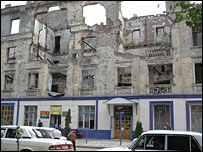|
By Timur Aliyev
Independent Chechen journalist
|

In the past decade of conflict Chechnya has become a haven for racketeers, who profit from oil thefts, kidnapping and embezzlement of state funds allocated to help rebuild the devastated republic.
 |
|
QUICK GUIDE

|
|
The theft and illegal refining of oil appears to be the most lucrative enterprise.
Musa Eskerkhanov, director of the Groznneftegaz oil company, says that up to 600 tons of oil is being pilfered in Chechnya daily.
Convoys guarded by armed men smuggle oil to the neighbouring Russian regions of Ingushetia, Dagestan and North Ossetia at night, Mr Eskerkhanov told members of the pro-Moscow Chechen government.
Andarbek Kagermanov, a Chechen Interior Ministry officer, says there are two types of theft - siphoning from pipelines and the theft of oil directly from oil wells.
"Everybody does the former, while the latter is the business of 'Kadyrovtsy'," he says, referring to supporters of the late Chechen President Akhmad Kadyrov.
A police unit, popularly known as the oil regiment, was set up to protect pipelines and oil wells. Grozneftegaz spends 300m roubles (more than $10m) a year on it, but this does not help.
People who monitor this type of crime claim that nearly all the security forces based in Chechnya profit from oil.
According to Pavel Solodovnikov, a Federal Security Service (FSB) officer, "the 'Kadyrovtsy' get their cut by transporting oil outside Chechnya, co-operating with federal troops who get their money at military checkpoints".
"Each oil well is controlled by the local military commandant's office. Even the makeshift refineries which produce cheap poor-quality petrol are controlled by federal units or pro-Moscow Chechen troops," he says.
Arms bazaar

Late President Akhmad Kadyrov and his son, Ramzan, formed a private army known as "Kadyrovtsy"
|
Weapons are no longer a major commodity, although only recently this was a flourishing business.
"Until the beginning of the second war [in 1999] every man in Chechnya kept arms at home, but now people are afraid of searches," says Ruslan Zhadayev, an analyst with the Chechen Society newspaper.
Between 1996 and 1999, when Grozny was controlled by the rebels, there was an open, legal arms bazaar in the centre of the Chechen capital Grozny. A machine-gun could be bought there for $200-300. Grenades were sold for 30 roubles [$1] apiece.
Now there is a black market in arms in Chechnya, with weapons being supplied "from army and police stores," says Aslan Mezhidov, an investigator at the Chechen prosecutor's office.
But the separatist rebels are "only buying ammunition, like cartridges and grenades for grenade-launchers," Mr Mezhidov adds.
Trading lives
Kidnapping became widespread in Chechnya in 1997, when a group of Russian NTV journalists was captured. It is alleged that the company paid $1m for their release.
After that, the hostage business escalated.
Kidnappers made millions of dollars targeting foreign humanitarian workers, missionaries and Russian officials. Failure to pay a ransom led to brutal killings of hostages. In one notorious case, three British Granger Telecom engineers and a New Zealander were beheaded by their captors.

Jon James and Camilla Carr - aid workers kidnapped in Chechnya
|
A former rebel, Ruslan, claims that the Russian military got involved in this business after the beginning of the second war. He says that, after the rebels were pushed out of Grozny in 2000, high-ranking military officers arranged to buy the bodies of servicemen killed in action for $300 a body.
Human rights organisations recorded numerous cases of locals having to pay for the release of their relatives captured during widesread mopping-up operations and night searches.
"They were held at Khankala [a Russian military base] or in district commandants' offices," says Abu Gutsiyev, an investigator who deals with missing persons cases.
He says not only federal troops but also pro-Moscow Chechen units commanded by Ramzan Kadyrov and Said-Magomed Kakiyev took part in these operations. He claims that there were private prisons in several villages near Grozny.
"Dead bodies were sold for $1,000-2,000. Captives who were left alive cost much more - from $3,000 to $20,000, depending on their relatives' finances," Mr Gutsiyev says.
The kidnapping business is currently in decline. Of 226 people kidnapped this year none was ransomed. However, Usam Baysayev, an activist in the Memorial human rights organisation, suggests that relatives do not report on their transactions with kidnappers for fear of endangering the lives of captives.
Embezzlement
The embezzlement of funds allocated for the reconstruction of Chechnya has become another source of income for Chechen and Russian officials.

Bureaucrats profited from ill-fated reconstruction projects in Chechnya
|
According to the Russian Audit Chamber, of 62bn roubles (more than $2bn) sent to Chechnya between 2000 and 2003, 5bn roubles was "spent extremely inappropriately", that is - stolen.
Most of this money disappeared in 2003, when 1bn roubles was embezzled through placing orders bypassing official tenders, and 69m roubles was paid for contracts that were never implemented.
Ruslan Ginazov, an employee of the Agropromstroy construction company, says it is impossible to get money for the reconstruction of ruined houses and industrial facilities without bribing officials at the Russian construction ministry.
"You can't get an order without a kickback," he says.
Sometimes the same building is officially restored several times or a partly-ruined building is declared restored in official documents, he explains.
He alleges that his company could not get contracts or pay salaries to its staff for two years, because the management refused to bribe an official.
The Russian construction ministry's directorate for rebuilding Chechnya would not comment on these allegations.